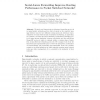Free Online Productivity Tools
i2Speak
i2Symbol
i2OCR
iTex2Img
iWeb2Print
iWeb2Shot
i2Type
iPdf2Split
iPdf2Merge
i2Bopomofo
i2Arabic
i2Style
i2Image
i2PDF
iLatex2Rtf
Sci2ools
166
Voted
ESA
2011
Springer
2011
Springer
Social-Aware Forwarding Improves Routing Performance in Pocket Switched Networks
We study and characterize social-aware forwarding protocols in opportunistic networks and we derive bounds on the expected message delivery time for two different routing protocols, which are representatives of social-oblivious and social-aware forwarding. In particular, we consider a recently introduced stateless, social-aware forwarding protocol using interest similarity between individuals, and the well-known BinarySW protocol, which is optimal within a certain class of stateless, social-oblivious forwarding protocols. We compare both from the theoretical and experimental point of view the asymptotic performance of Interest-Based (IB) forwarding and BinarySW under two mobility scenarios, modeling situations in which pairwise meeting rates between nodes are either independent of or correlated to the similarity of their interests.
| Added | 20 Dec 2011 |
| Updated | 20 Dec 2011 |
| Type | Journal |
| Year | 2011 |
| Where | ESA |
| Authors | Josep Díaz, Alberto Marchetti-Spaccamela, Dieter Mitsche, Paolo Santi, Julinda Stefa |
Comments (0)

